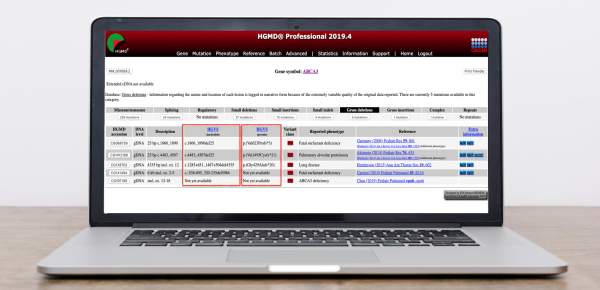


















The Winter 2019 Release of the Human Gene Mutation Database (HGMD) Professional is available, expanding the world’s largest collection of human inherited disease mutations to over 275,000 entries–that’s 11,699 more than the previous release.
HGMD Professional is the de facto standard resource for comprehensive coverage of published germline mutations in nuclear genes that underlie, or are closely associated with, human inherited disease.
A subset of the HGMD gross deletions has now been mapped to both builds of the reference genome (NCBI38/hg38 and legacy NCBI37/hg19). Due to the absence of accurate breakpoint data for most of these lesions, 3,348 entries have been mapped in this release. HGVS nomenclature is also provided for this dataset.
In addition to the standardized HGVS descriptions provided by HGMD, users can now view predicted HGVS nucleotide-level descriptions based on non-canonical RefSeq and Ensembl transcripts.

Founded and maintained by the Institute of Medical Genetics at Cardiff University in 1996, HGMD Professional provides users with a unique resource that can be utilized not only to obtain evidence to support the pathological authenticity and/or novelty of detected gene lesions and to acquire an overview of the mutational spectra for specific genes, but also as a knowledge base for use in bioinformatics and whole-genome screening projects. Unlike other mutation databases, HGMD mutations are all backed by peer-reviewed publications where there is evidence of clinical impact.
The number of disease-associated germline mutations published per year has more than doubled in the past decade (Figure 1). As rare and novel genetic mutations continue to be uncovered, having access to the latest scientific evidence is critical for timely interpretations of next-generation sequencing (NGS) data.

View the complete HGMD Professional statistics here.
HGMD Professional helps clinical testing labs analyze and annotate next-generation sequencing (NGS) data with current and trusted information. Unlike other mutation databases, HGMD mutations are all backed by peer-reviewed publications where there is evidence of clinical impact.
To get the most out of your HGMD Professional subscription, visit our Resources webpage for case studies, technical notes, and video tutorials. Or hear from Peter Stenson, manager of HGMD, in an on-demand webinar on how HGMD has empowered a generation of geneticists for precision medicine here.
Or hear from Peter Stenson, manager of HGMD, in an on-demand webinar on how HGMD has empowered a generation of geneticists for precision medicine here.
New ANNOVAR databases are also available.
Learn more about how ANNOVAR can be used with HGMD for variant annotation. Watch a recorded webinar featuring ANNOVAR here.
The Genome Trax™ update will roll out at the end of January, 2020. Updated tracks have been released with HGMD 2019.4 content for all HGMD-related tracks.
For labs looking to generate clinician-grade reports for germline or somatic NGS testing, QIAGEN Clinical Insight (QCI) Interpret reproducibly translates highly complex NGS data into standardized reports using current clinical evidence from the QIAGEN Knowledge Base, which consists of over 40 public and proprietary databases, including HGMD Professional.
Click here for a free demonstration of QCI Interpret.